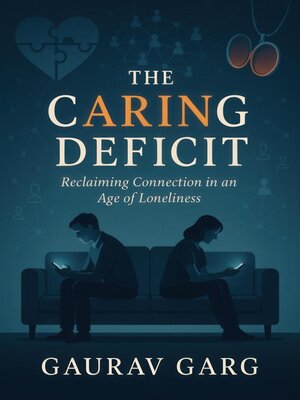
Sign up to save your library
With an OverDrive account, you can save your favorite libraries for at-a-glance information about availability. Find out more about OverDrive accounts.
Find this title in Libby, the library reading app by OverDrive.



Search for a digital library with this title
Title found at these libraries:
| Library Name | Distance |
|---|---|
| Loading... |
Have you felt it?
It's a quiet hum of static just beneath the noise of your daily life. A subtle, persistent feeling of being adrift in a sea of people. It's the paradox of holding a device in your hand that connects you to billions, yet feeling a hollowness in your own living room that no amount of scrolling can fill. It's the digital fatigue that settles in at the end of the day, a bone-deep weariness that comes not from physical labor, but from the relentless, low-grade performance of a curated life.
You are not alone in feeling this way. This feeling has a name. It is the signature emotional texture of our age, the defining crisis of the 21st century. It is the Great Disconnection.
The symptoms are everywhere, no longer just academic theories but our lived, daily reality. The "loneliness epidemic" is not a headline; it's the silence in the apartment next door. "Burnout" is not a workplace buzzword; it's a spiritual exhaustion from the relentless pressure of the Productivity Poison.
We have become experts at managing the surface of our lives while neglecting the foundations. We optimize our calendars, our careers, and our content feeds with ruthless efficiency, yet the skills required for deep, resilient connection have been allowed to atrophy. Our conversations have become performances, a narcissistic exchange of talking points designed to signal our virtue rather than share our vulnerability. We have outsourced our intimacy to AI companions and our sense of community to the fleeting warmth of a viral trend, mistaking the algorithm's echo for a human voice.
The result is a world filled with the ghosts of connection. We have followers but not friends, networks but not neighbors. We live in a state of perpetual, low-grade conflict, from the tense holiday dinner table to the toxic battleground of the online comment section, all suffering from the same core ailment: we have forgotten how to see the humanity in each other. We scroll through endless feeds of curated joy and performative outrage, all while feeling a growing, gnawing sense that something essential has been lost.
Does anyone really care?
This book is an extended, unflinching, and ultimately hopeful attempt to answer that question. The answer, you will find, is a qualified, courageous, and deeply practical yes. But it is a yes that comes with a mandate.
This is not another book that will simply diagnose our modern malaise and leave you in a state of informed despair. Nor is it a collection of sentimental platitudes about the power of love. Instead, this book is a roadmap. It is a practical, evidence-based guide to the lost art of human connection. We will journey from the intricate wiring of the mirror neuron to the practical, daily life of a thriving neighborhood. We will deconstruct the powerful forces that are actively working to keep us apart, and we will assemble a specific, learnable toolkit of skills to fight back.
You will learn that the solutions to our largest, most daunting societal problems are not found in a new technology or a grand political movement, but in a series of small, courageous, and profoundly human choices. The path back to each other does not require a revolution in our society as much as it requires a quiet rebellion in our own living rooms, our workplaces, and our hearts.







